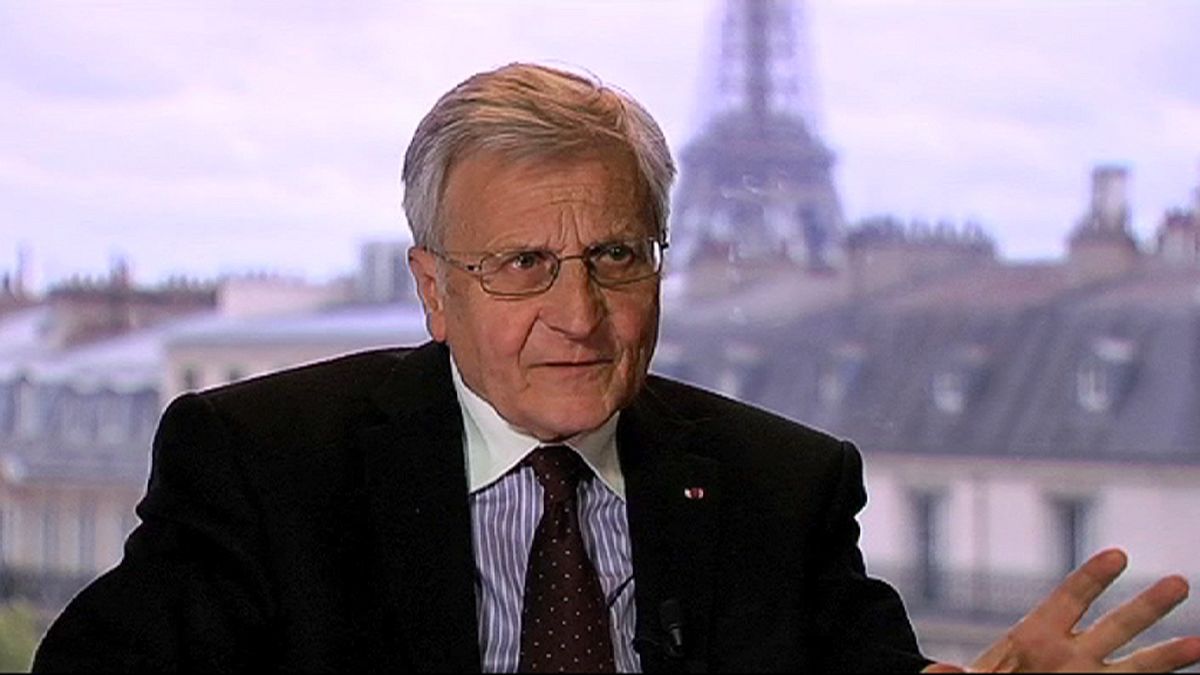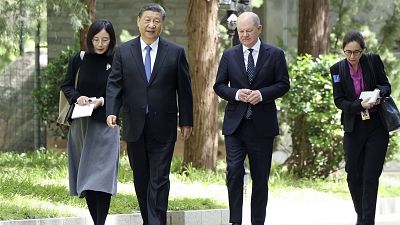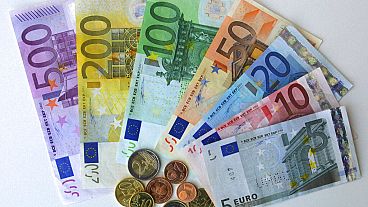With Europe still mired in recession, euronews asked the former President of the European Central Bank, Jean-Claude Trichet, to consider the results of efforts to stabilise the region, and if he still thinks the eurozone is taking the right medicine.
Giovanni Magi, euronews: “Are austerity policies really the best solution, or, as some economists are saying, are they simply an application of counterproductive dogma?”
Jean-Claude Trichet, former ECB President: “I believe that words count. We talk about austerity as much in the United States as in England, or even in Japan, in a country with a very big current account payment deficit, like Greece or other countries which are in excess. The term [austerity], I think, is inappropriate.
“There is a need for wise, healthy management, when one is spending more than one is earning. For what reason? It is not really a choice but an obligation, because, I’d say, generous donors are no longer to be found – eternally ready to finance the countries that spend far more than their income. And it seems to me that sound management is the best way to lay the groundwork for future growth and job creation in the future.”
euronews: “But we get the impression that, on the world chess board, Europe seems to stand alone with its obsession for public accounts.”
Trichet: “No, I don’t think we can say that. There is major pubic debate in the United States, over whether the first thing to do is to place the stress on putting the public finances back into working order, or not. This is also under debate in England: austerity or growth. Europe is still the epicentre of the global crisis of sovereign debt risk and, therefore, budget crises. Unfortunately, that is partly its own fault, because, in some cases it was negligent.
“It was and still is the epicentre, if I may say. But I think we still have to look at things clearly: Europe has made enormous progress. It is still at the very crux of this crisis but it has distanced the risk of catastrophe thanks to the decisions it has taken – governments, the European institutions and the Central Bank. Therefore, we are now at a stage where we absolutely must consolidate everything which might permit a return to growth.”
euronews: “What lesson can we draw from the Greek or Cypriot crisis? Perhaps some economies were too feeble to be admitted into the euro zone? Or are the stronger euro zone economies not ready to pay a high cost to protect the poorer members?”
Trichet: “First of all, saying that countries are necessarily richer or poorer is debatable, you know. Our problem today is that there are countries, fortunately relatively numerous, that are competitive, that sell their goods and services comfortably on the domestic, European and world markets, and have good reasons for that, because they have a good grip on their costs and structural reforms; and then there are countries that have mastered their costs far less well, and which have not reformed structurally, and these countries are evidently in difficulty.
“So, I believe that the great lesson is that there has to be a staggering improvement in the economic and budgetary governance of the whole euro zone. It has to be very firm when this or that country becomes dangerous to itself and to the entire zone.”
euronews: “Are you in favour of a European economic and budgetary federation? What should its criteria be, and do you think that would be a realistic route for Europe to take today?”
Trichet: “I do believe we need to go further along the path of a European economic and budgetary federation, which obviously would mean a new change in the Treaties. Personally, I think there are several possibilities to consider. One of them seems imaginable to me, though I don’t say it’s the only one, and I’m not saying it’s necessarily the best, but I think it fulfils three criteria.
“One: it is efficient, which I will develop for you; two: it is democratic; and three: it respects the principle of subsidiarity. These three things appear essential to me. If a country manages its affairs very badly, does not respect recommendations made to it by the European Commission and the Council, and in doing this endangers the euro zone’s stability, as we have seen amply in the crisis, then there are sanctions that are supposed to act as a deterrent – sanctions in the form of fines. I don’t believe that works. It hasn’t worked in the past and I don’t think it will in the future.
“Instead, what I myself see as more realistically imaginable is, instead of fines: activate a federal decision process at the level of the European institutions taken together. The Commission plays the role of government, it anticipates a government; the Council of governments is a sort of upper chamber, a Senate, and the European Parliament with its members elected by direct universal suffrage and who will be elected in the next European poll, act as the lower chamber. I suggest that the Commission say: here is what needs to be done; let the Senate, the upper chamber, think about it and then say to the European Parliament: here’s what we think, and then the European Parliament decides – evidently limited to the representatives of the euro zone, and after contact with the national parliaments.
“That is a federation – we have ‘activated’ federal institutions. But they respect the principle of subsidiarity, because this is not applied generally; it would only be in absolutely exceptional cases, and when the stability of the whole zone is in question. It’s evidently democratic. The ultimate decision is taken by the representatives of the people, and that makes it relatively certain that these are not just empty words, and that this is not an ineffective dissuasive measure of fines.”
euronews: “There is an alignment being formed in Europe, notably with France, Italy and Spain, who are adopting an approach of reasoning by dialogue with the policy of German Chancellor Angela Merkel. How do you see that?”
Trichet: “I don’t share that feeling. I am too deeply attached to the friendship among Europeans, and of course the friendship between France and Germany, to either rule out or not see that, beyond this or that agitation, there is a real will to move forward together, and a real will to overcome the difficulties that Europe has encountered systematically, that it has dealt with and responded to in a way that is indisputable when we look at everything that has been done at this terribly difficult time.”



